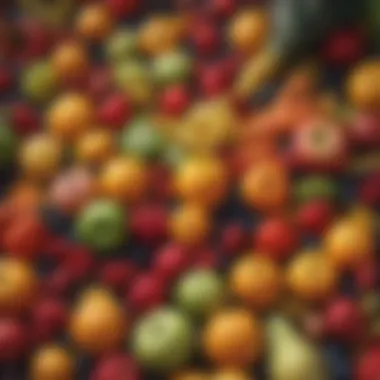Understanding Foods That Cause Kidney Stones


Intro
Understanding the foods that can lead to kidney stones is essential for maintaining kidney health. Over the years, medical studies have repeatedly shown that diet plays a crucial role in the formation of these painful stones.
Unlike some health issues, kidney stones are often preventable through careful dietary choices. This article examines high-risk foods associated with stone formation and offers practical strategies for managing dietary habits to reduce risk. By learning about the link between nutrition and kidney stones, individuals can take proactive steps to safeguard their urinary health.
Key Concepts and Terminology
Basic Definitions
To comprehend the issue, it is important to define key terms related to kidney stones:
- Kidney Stones: Solid masses formed in the kidneys from minerals and salts. They can vary in size, shape, and composition.
- Ureter: The tube that connects the kidney to the bladder, through which stones may pass.
- Lithiasis: A condition characterized by the formation of stones in the body.
Understanding these terms lays the foundation for discussing dietary influences.
Historical Context
Historically, kidney stones have been documented since ancient times. Ancient Egyptians, for instance, produced surgical tools to treat this condition. With advancements in medical science, the understanding of stone formation has evolved. Researchers now identify specific dietary components that contribute to different types of kidney stones, including calcium oxalate, uric acid, and struvite stones.
High-Risk Foods and Kidney Stones
Certain foods are known to heighten the risk of kidney stones. Diets rich in the following components may lead to stone formation:
- Oxalates: Found in foods such as spinach, beets, and chocolate. High oxalate intake can significantly increase the risk of developing calcium oxalate stones.
- Animal Proteins: Excessive intake of red meat and shellfish can lead to higher levels of uric acid in the body.
- Sugars and Fructose: Sugary drinks and high fructose corn syrup can lead to increased calcium excretion, contributing to stone formation.
While dietary oxalates are a concern, cooking and processing can alter their effects.
Nutritional Management and Preventative Strategies
It is crucial to adopt a diet that supports kidney health:
- Eat Calcium: Contrary to some beliefs, calcium-rich foods can help prevent stone formation. Aim for sources like yogurt and cheese.
- Stay Hydrated: Drinking plenty of water reduces stone concentration in urine.
- Limit High-Oxalate Foods: Monitoring intake of foods such as nuts, tea, and wheat bran can reduce risks.
Practical Applications and Techniques
For those seeking to manage their diet effectively:
- Engage in Regular Check-ups: Regular visits to a healthcare professional can identify stone formation risk factors early.
- Food Journaling: Keeping track of food intake can help identify problematic foods.
- Consult a Dietitian: For personalized guidance, professional advice can be invaluable.
In summary, the knowledge shared in this article aims to empower readers to make better dietary choices. The journey to better kidney health begins with understanding how specific foods impact stone formation. By being proactive in their diet, individuals can greatly reduce their risk of kidney stones.
Intro to Kidney Stones
Kidney stones are a common yet serious health issue affecting millions of people globally. Understanding what these stones are and how they form is essential for anyone concerned about their kidney health. This section serves as a foundational overview, preparing the reader for a deeper exploration into dietary influences that may contribute to kidney stone formation.
One of the most notable aspects of kidney stones is their composition. Depending on their type, stones can develop from various substances within the urine. Consequently, identifying the types of stones helps in understanding which dietary choices can potentially lead to their formation.
The impact of kidney stones on health is significant. Besides causing acute pain, they can lead to long-term complications, including infections or kidney damage if not addressed properly. The urgency of managing kidney stone risks cannot be overstated and emphasizes the importance of informed dietary choices.
Definition and Types of Kidney Stones
Kidney stones are solid masses formed from crystals that develop in the kidneys. These stones can vary in size and may range from tiny, sand-like grains to larger stones that can obstruct the urinary tract. There are four primary types of kidney stones:
- Calcium Oxalate Stones: The most common type, formed when calcium combines with oxalate in the urine. Certain foods, particularly high-oxalate items, can elevate oxalate levels.
- Uric Acid Stones: These stones develop when urine is persistently acidic. A diet high in purines, often found in animal proteins, can increase the risk.
- Struvite Stones: Typically resulting from urinary tract infections, these stones can grow rapidly and may require surgical intervention.
- Cystine Stones: These are rare and are caused by a genetic disorder leading to high levels of cystine in the urine.
Understanding these definitions helps highlight how food choices can influence stone formation, revealing the critical connection between diet and kidney health.
Prevalence and Impact on Health
Kidney stones are a prevalent health disorder, affecting approximately 10-15% of the population at some point in their lives. For individuals aged 30 to 60, this prevalence can be even higher, especially among those with specific dietary patterns or genetic predispositions.


The impact of kidney stones extends beyond physical discomfort. Many people experience recurrent episodes of kidney stones, leading to increased medical visits, potential surgeries, and a significant toll on quality of life. The pain associated with these stones can be severe and debilitating, often described as one of the worst types of pain.
Moreover, there is a growing concern about the healthcare costs associated with kidney stones. Treatment options can vary from conservative management to surgical removal, leading to both direct medical expenses and indirect costs such as loss of productivity. As the prevalence continues to rise worldwide, it is essential to explore preventative strategies and dietary modifications that can reduce risk.
"Dietary management is crucial to prevent the formation of new stones and reduce recurrence rates."
Overall, understanding the prevalence and health impact of kidney stones sets the stage for a thoughtful examination of dietary habits that may help mitigate risks. This knowledge equips individuals with the information necessary to make informed food choices that support kidney health.
How Diet Influences Kidney Stone Formation
Diet plays a crucial role in the occurrence and prevention of kidney stones. Understanding how certain foods affect stone formation is essential for anyone at risk. This knowledge empowers individuals to make informed dietary choices, potentially reducing stone incidents. Here, we explore specific dietary elements that contribute to kidney stone development and the benefits of managing one's diet effectively to improve kidney health.
Understanding Metabolic Pathways
Metabolic pathways are the series of chemical reactions that occur in the body. These pathways can be influenced by what we eat. For instance, a diet high in oxalates can lead to the formation of calcium oxalate stones, the most common type of kidney stones. Oxalates are naturally found in foods like spinach, beets, and nuts.
When oxalates are absorbed into the bloodstream, they can bind with calcium in the urinary tract and form stones. Understanding this metabolic process is vital for those who wish to avoid kidney stones.
Some foods may also increase uric acid production. High animal protein diets, particularly from sources like red meat and shellfish, can elevate uric acid levels, contributing to uric acid stones. Thus, careful consideration of dietary components is essential in managing kidney stone risks.
Role of Hydration in Kidney Health
Hydration is a fundamental aspect of kidney health. Drinking enough fluids helps dilute substances in the urine that may form stones. When the urine is concentrated, the risk of stone formation increases significantly.
It is often recommended that individuals who are prone to kidney stones drink at least eight glasses of water a day. This might vary based on climate, activity level, and other health factors. Staying hydrated also helps the kidneys flush out waste products efficiently, reducing the burden on these vital organs.
"Adequate hydration is key to preventing kidney stones. It dilutes the urine and minimizes the concentration of stone-forming substances."
Common Types of Kidney Stones
Understanding the common types of kidney stones is essential for identifying dietary factors that can contribute to their formation. Each type has its own unique characteristics and requires specific dietary considerations. This section provides insights into the four primary types of kidney stones: calcium oxalate, uric acid, struvite, and cystine stones. Knowing the types can help individuals make informed dietary choices and mitigate risks associated with kidney stone development.
Calcium Oxalate Stones
Calcium oxalate stones are the most common type of kidney stones, accounting for about 80% of cases. These stones form when calcium combines with oxalate in the urine. Oxalate can come from various dietary sources, including spinach, beets, and nuts. A diet high in oxalate may increase the risk of forming these stones.
People prone to calcium oxalate stones often find it helpful to limit high-oxalate foods. However, it’s important not to eliminate calcium completely, as adequate calcium intake may help bind oxalate in the gut, reducing its absorption.
Uric Acid Stones
Uric acid stones arise from an excess of uric acid in the urine. This type can be influenced by diet, notably through the consumption of animal proteins such as red meat and fish. These foods can increase uric acid levels, elevating the possibility of stone formation. Other high-purine foods like organ meats and shellfish also contribute.
To lessen the risk of uric acid stones, an individual may consider reducing the intake of these foods. Increasing fluid intake and maintaining an alkaline urine can also be beneficial.
Struvite Stones
Struvite stones, though less common, typically form in response to urinary tract infections (UTIs). They can develop when bacteria produce ammonia, which combines with magnesium and phosphate. Struvite stones can grow large quickly and may lead to complications.
Dietary changes to prevent struvite stones focus more on managing UTIs than on specific food avoidance. Adequate hydration and preventive measures against infections are crucial.
Cystine Stones
Cystine stones result from a rare genetic disorder that causes cystine to leak into the urine. While cystine is a naturally occurring amino acid, its excessive excretion induces stone formation. These stones are more resistant to treatment and can be recurrent.
For individuals with cystinuria, increasing fluid intake is vital. Limiting dietary sodium may also help, as sodium can raise cystine levels in urine.
Understanding the types of kidney stones highlights the crucial link between diet and stone formation. It serves as a foundation for providing tailored dietary recommendations.
Foods that Contribute to Kidney Stone Formation
The foods we consume play a significant role in our overall health. When we focus on kidney stones, dietary choices become even more crucial. This section delves into how specific foods can contribute to the development of kidney stones. Understanding these foods will help individuals make informed dietary decisions that can mitigate the risk of stone formation.
High-Oxalate Foods


High-oxalate foods are of particular concern when discussing kidney stone formation. Oxalates can bind with calcium in the body, leading to the development of calcium oxalate stones, the most common type of kidney stone. By being aware of high-oxalate foods, an individual can reduce their risk effectively.
Spinach
Spinach is well-known for its nutritional benefits. However, its oxalate content is significant. With a high concentration of oxalates, spinach may contribute to kidney stone formation in susceptible individuals. While spinach is beneficial due to vitamins and minerals, its disadvantages must be considered for those prone to stones. It is wise for such individuals to moderate their spinach intake.
Beets
Beets are another vegetable high in oxalates. They add color and sweetness to dishes, but they also present risks for people who are prone to kidney stones. Their unique feature is their natural sugars and antioxidants, which can offer health benefits. Still, when it comes to kidney stone risk, moderation is the key.
Nuts and Seeds
Nuts and seeds are generally regarded as healthy fats and a source of protein. However, many nuts have high oxalate levels. This can pose a risk for individuals predisposed to developing kidney stones. Peanuts and almonds are examples that should be consumed with caution. While they have numerous health benefits, awareness and moderation are critical for maintaining kidney health.
Animal Proteins
Animal proteins can lead to kidney stones through increased calcium and uric acid levels. Research shows that high consumption of red meat, poultry, and fish can heighten the risk. Care should be taken in managing intake levels, especially for those with a history of kidney stones.
Red Meat
Red meat is a popular protein source but is often linked to higher stone risks. Its metabolism increases uric acid levels in the blood, potentially leading to uric acid stones. Being aware of how much red meat to consume is crucial. Reducing intake can help in lowering kidney stone formation risk.
Poultry
Poultry, such as chicken and turkey, is generally healthier than red meat. However, it still contributes to uric acid production. The key characteristic here is that while poultry has its benefits, it is essential to monitor consumption. The balance of dietary proteins should be well managed for those prone to stones.
Fish
Fish is often considered a healthy alternative to other meats. However, varieties like sardines and mackerel are high in purines, leading to increased uric acid when metabolized. Careful selection of fish can play a role in dietary management for kidney stone prevention. Non-purine rich fish can be a safer option for health-conscious individuals.
Sugary Beverages
Sugary beverages pose a significant risk factor for kidney stone formation. These drinks can increase calcium and uric acid levels in the urine, promoting stone formation.
Sodas
Sodas are a major contributor to the prevalence of kidney stones. The high phosphoric acid content found in colas can lead to further complications in kidney health. Reducing or avoiding soda intake is prudent for individuals seeking to manage their kidney stone risk effectively.
Fruit Juices
Many believe fruit juices are healthy; however, certain juices, particularly those high in fructose, can pose risks. Regular consumption can lead to elevated calcium levels, increasing the chances of stone formation. It may be wise to limit intake or opt for fresh, whole fruits instead.
Salt Excess
Excessive salt intake can raise uric acid levels in the blood. It can also hinder the kidneys' natural ability to excrete calcium, which leads to a higher risk of stone formation. It is important to monitor salt consumption and seek alternative seasoning methods to enhance food flavor. Reducing salt intake can be beneficial for overall kidney health.
Dietary Recommendations for Preventing Kidney Stones
Preventing kidney stones through dietary choices is crucial. A well-planned diet can lower the risk of forming these painful stones, which affect many individuals. Knowledge of which foods to consume or avoid will empower individuals, especially those prone to developing stones. Nutrition plays an essential role in maintaining kidney health and minimizing risks.
Importance of Calcium Intake
Calcium is commonly misunderstood in the context of kidney stone formation. Many people think that lowering calcium intake will help prevent stones. However, studies indicate that adequate calcium actually helps to prevent the absorption of oxalate in the intestines. When oxalate levels are reduced, there is less chance of calcium oxalate stones forming in the kidneys.
Incorporating calcium-rich foods can be beneficial. Low-fat dairy products such as milk, yogurt, and cheese are excellent options. These foods provide essential calcium while also offering other health benefits. It is crucial to strike a balance; excess calcium supplements can lead to complications, but natural food sources can improve kidney health effectively.
Incorporating Hydration Strategies
Hydration is another fundamental aspect when discussing dietary recommendations. Sufficient fluid intake dilutes the substances in urine that lead to stones, making it less likely for them to form. Aim for a daily intake of at least 2-3 liters of fluids to promote optimal hydration. Water is the best choice, but fluids can include herbal teas or clear broths.
It is beneficial to encourage regular hydration habits. For example, drinking a glass of water with each meal or keeping a water bottle handy can promote consistent fluid intake. Particularly during warmer months, individuals should attentively increase their intake to counteract losses from sweat. Hydration is perhaps one of the simplest, yet most effective methods for stone prevention.


Balancing Nutrient Intake
Another essential aspect involves balancing various nutrients in the diet. While it is vital to focus on calcium and hydration, other nutrients play a role as well. A diet low in sodium may help reduce stone risk by limiting calcium excretion in urine. It is advisable to limit processed foods which often contain high amounts of salt.
Fruits and vegetables should be staples of a balanced diet. They not only provide vitamins and minerals but also contain potassium, which is beneficial for kidney health. Engaging in mindful eating and ensuring a variety in food choices can help maintain a healthy balance.
In summary, dietary recommendations for preventing kidney stones are multifaceted. Focus on adequate calcium intake, practice good hydration, and balance nutrient consumption to support kidney health effectively.
Professional Perspectives on Dietary Management
When discussing ways to prevent kidney stones, professional perspectives on dietary management play a crucial role. Managing food intake is vital not only for individuals at risk of developing kidney stones but also for healthcare providers in recommending viable preventive measures. Nephrologists and dietitians bring their expertise to the table, providing insights that are essential for understanding the dietary components influencing kidney health.
Dietary management focuses on a tailored approach. It involves recognizing the unique dietary needs based on the type of kidney stones a person is predisposed to developing. Effective management can lead to decreased occurrences of stone formation and improved overall kidney function. Adopting the advice of specialists can help create a balanced diet tailored to specific needs, which is fundamental for both prevention and treatment.
This aspect of dietary management emphasizes the significance of bridging medical research with practical dietary advice, ensuring that individuals are well-informed about their food choices. Incorporating perspectives from medical professionals can guide not only patients but also the broader community towards better health outcomes.
Insights from Nephrologists
Nephrologists focus on the physiology of the kidneys and their functions. They provide valuable insights regarding the effects certain foods have on kidney stone formation. Concerns often center around the intake of oxalate-rich food, sodium, and animal proteins. For example, nephrologists may stress the need to limit high-oxalate foods such as spinach, almonds, and beets, as they could lead to calcium oxalate stones, the most common type of kidney stone.
Patients are encouraged to monitor their hydration status closely. Nephrologists typically recommend drinking sufficient water daily, as increased fluid intake can significantly dilute the substances in urine that contribute to stone formation. Regular follow-ups and discussions with nephrologists can help individuals adjust their diets based on personal health changes, making their advice invaluable.
Dietitians’ Recommendations
Dietitians play a distinct but complementary role to nephrologists by providing practical nutritional advice. They analyze individual dietary patterns and create personalized meal plans aimed at maintaining kidney health and minimizing stone formation. Dietitians often recommend a balanced intake of calcium, which is paradoxically essential despite its association with calcium stones, as it can bind oxalates and reduce the risk of stone formation.
In regards to protein, they recommend moderation, specifically limiting red or processed meats, which have been linked to higher uric acid levels and could contribute to stone formation in susceptible individuals. Furthermore, dietitians often advocate for reducing added sugars and salt, which have been shown to exacerbate the risk of developing kidney stones.
By leveraging their knowledge in food science and nutrition, dietitians provide essential strategies for individuals to navigate their dietary choices effectively, facilitating long-term kidney health.
"Understanding dietary influences through professional guidance can significantly reduce the incidence of kidney stones and encourage healthier lifestyles."
Lifestyle Factors and Their Influence
Lifestyle choices can significantly impact kidney health. This section discusses how certain habits affect the formation of kidney stones. Understanding these factors is important not only for prevention but also for overall well-being.
Physical Activity and Kidney Health
Physical activity plays a crucial role in maintaining kidney health. Regular exercise can aid in weight management and reduce the risk of certain conditions linked to kidney stones, such as obesity and diabetes. Physical activity helps regulate urinary calcium levels, which can help prevent the formation of stones. Moreover, exercise promotes good hydration habits, encouraging individuals to drink water before, during, and after workouts.
A study indicated that active individuals are less likely to develop kidney stones compared to those who lead sedentary lifestyles. It is recommended to engage in moderate activities, such as walking, swimming, or cycling, for at least 150 minutes a week. Not only does this help maintain a healthy weight, but it also supports proper kidney function by promoting efficient waste removal from the body.
Alcohol Consumption
Alcohol consumption can have mixed effects on kidney health. Moderate drinking might not significantly harm the kidneys; however, excessive intake can lead to dehydration, which raises the risk of stone formation. Alcohol may inhibit the body's ability to absorb nutrients essential for kidney function, including magnesium and potassium. This can cause imbalances that contribute to kidney stones.
Specific types of alcohol, particularly beer, have been associated with lower risk of certain stones due to their high water content and ability to promote urination. However, this does not suggest that alcohol consumption is safe or beneficial for everyone. Those with a history of kidney issues should be cautious. Limiting alcohol intake is generally advisable, alongside maintaining hydration with water.
"Maintaining an active lifestyle and moderating alcohol consumption can significantly influence kidney health and prevent kidney stones."
Culmination
The examination of dietary influences on kidney stone formation carries significant consequences for both health management and preventive strategies. Understanding which foods can exacerbate the risk of development of kidney stones is a vital aspect of avoiding painful occurrences and enhancing overall renal health. The insights gathered throughout the article emphasize the role of specific dietary components and how they can lead to detrimental health outcomes.
One central takeaway from this discussion is the necessity for individuals at risk of kidney stones to monitor their diet closely. Reducing intake of high-oxalate foods, animal proteins, and excess salt can be essential for minimizing the likelihood of future stone formation. The balance of hydration cannot be overstated, as maintaining adequate fluid intake is a preventive cornerstone. For agriculture farmers and enthusiasts, understanding these dietary nuances can foster better health decisions, not only personally but also in providing informed recommendations within their communities.
Summarizing Key Points
In summary, the article made several essential points:
- Types of kidney stones: Different types exist, such as calcium oxalate, uric acid, struvite, and cystine stones. Each type may have different dietary implications.
- Dietary contributors: High-oxalate foods, animal proteins, sugary beverages, and excessive salt intake can all raise the risk of kidney stone formation.
- Hydration's role: Adequate hydration is crucial in mitigating risks; increased water intake can help dilute stones and flush the kidneys.
- Professional recommendations: Insights from nephrologists and dietitians provide valuable guidelines for those concerned about kidney stone formation.
Future Directions in Kidney Stone Research
Looking ahead, further research is imperative to deepen the understanding of kidney stone formation. Future studies could include:
- Longitudinal studies: Tracking dietary habits and kidney stone incidents over extended periods to establish stronger correlations.
- Technological advancements: Utilizing data analytics and machine learning to identify patterns in dietary intake and kidney health more precisely.
- Broader dietary factors: Exploring the impact of a more extensive range of foods, nutrients, and food combinations on kidney stone risks.
- Public health initiatives: Promoting kidney health awareness and dietary education may pave the way for lower incidence rates of kidney stones in the general population.
In closing, tackling the complex interaction between diet and kidney stone formation remains an important field of inquiry. As diets evolve and lifestyles continue to change, ongoing research will be vital in combating this health issue.















